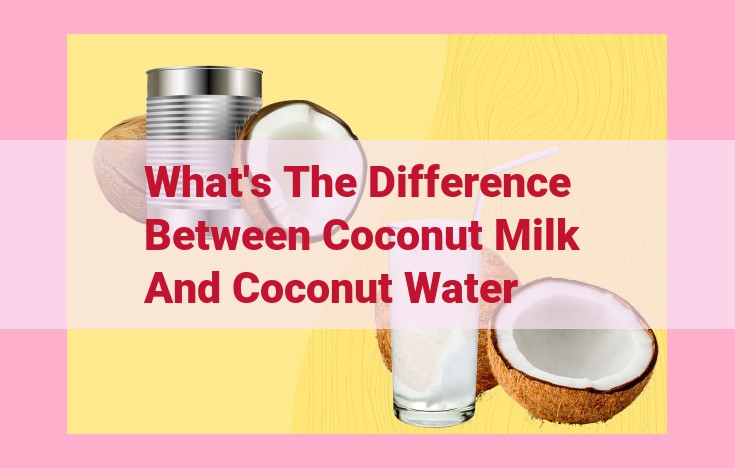Understanding The Differences: Coconut Milk Vs. Coconut Water

Coconut milk, made from pressed coconut meat, boasts a rich, creamy texture and a distinct coconut flavor. In contrast, coconut water is the clear liquid found inside young coconuts, offering a refreshing and slightly sweet taste. Coconut milk contains a high fat content, providing essential fatty acids and antioxidants. Coconut water, on the other hand, is low in fat but rich in electrolytes, making it a hydrating beverage.
Coconut Meat and Water: A Taste of Paradise
Imagine a tropical oasis where the towering coconut palms sway gently in the breeze, their lush greenery providing a refreshing shade. As you reach out to pluck a mature coconut, its hard outer shell encases a treasure trove of delicious and nutritious delights: the soft, white meat and the refreshing water.
Coconut meat is a culinary marvel, renowned for its unique texture and taste. It is soft yet slightly chewy, with a subtle sweetness and a hint of nutty flavor that evokes a sense of island paradise. The white flesh is a powerhouse of nutrients, containing fiber, healthy fats, and various vitamins and minerals.
The coconut water, on the other hand, is a liquid refreshment that naturally fills the coconut’s cavity. It is clear and slightly sweet, with a refreshing and hydrating taste. It is a natural source of electrolytes, such as potassium and magnesium, making it an excellent choice for rehydration after a workout or during hot weather.
Unveiling the Health Benefits of Coconut’s Rich Fat Content
In the realm of healthy fats, coconut stands tall as a nutritional champion. Its abundant fat content harbors a wealth of health-promoting compounds that have captivated the attention of nutritionists and health enthusiasts alike. Let’s delve into the remarkable benefits associated with this tropical delicacy.
HDL: Your Cholesterol Ally
Coconut is a lauric acid powerhouse. This unique fatty acid has a knack for raising your HDL (“good”) cholesterol levels. HDL acts as nature’s scavenger, whisking away harmful LDL (“bad”) cholesterol from your arteries, reducing the risk of heart disease.
Thyroid Hormone Boost
The medium-chain triglycerides (MCTs) found in coconut are easily broken down and rapidly absorbed by your body. This efficient conversion provides instant energy, supporting healthy thyroid function.
Anti-inflammatory Properties
Coconut fat contains lauric acid and myristic acid, which have proven anti-inflammatory effects. By reducing inflammation, coconut can alleviate a host of ailments, including arthritis and joint pain.
Weight Management Aid
MCTs have a remarkable ability to increase your metabolic rate and promote satiety, helping you feel fuller for longer. This can be a valuable asset for those seeking to manage their weight.
Antimicrobial Defense
Coconut oil has been hailed for its antimicrobial properties, effectively combating bacterial and fungal infections. This makes it a natural choice for skin health and wound healing.
Remember:
While coconut fat offers a plethora of health benefits, moderation is key. Enjoy it as part of a balanced diet, incorporating other sources of healthy fats like avocados, nuts, and seeds. By embracing the power of coconut, you can unlock a world of nutritional goodness and reap the remarkable rewards it holds.
Nutrient Content of Coconut-Based Products
When exploring the nutritional realm of coconuts, we encounter a diverse range of products, each with its unique composition. Let’s dive into the world of coconut cream and coconut skim milk to unravel their distinct nutritional profiles.
Coconut Cream: A Rich, Yet Surprising Source of Nutrition
Coconut cream boasts a velvety texture and tantalizing flavor that can elevate any dish. Contrary to popular belief, it shares minimal similarities with coconut meat and water in terms of nutritional content.
Despite its rich and creamy texture, coconut cream is surprisingly low in fat compared to coconut meat. It contains about 20% fat, primarily in the form of medium-chain triglycerides (MCTs). MCTs are easily digestible and may provide quick energy and other health benefits.
In terms of vitamins and minerals, coconut cream is a modest source of potassium, magnesium, and iron. However, its most notable nutritional feature lies in its high concentration of saturated fat (about 15%). While some saturated fats can be harmful to health, the type found in coconuts may have beneficial effects on cholesterol levels.
Coconut Skim Milk: A Lean Alternative with Distinct Nutritional Differences
Coconut skim milk is a lighter alternative to coconut cream, with a significantly lower fat content (about 1%). This makes it a great option for those seeking a dairy-free, low-fat milk substitute.
Compared to coconut cream, coconut skim milk is also lower in calories, carbohydrates, and protein. However, it retains a comparable amount of potassium, magnesium, and iron.
Coconut cream and coconut skim milk offer distinct nutritional profiles, catering to different dietary needs and preferences. While coconut cream is a rich source of healthy fats and certain vitamins, coconut skim milk provides a low-fat alternative with a similar mineral content. Understanding these nutritional nuances will help you make informed choices when incorporating these coconut-based products into your diet.